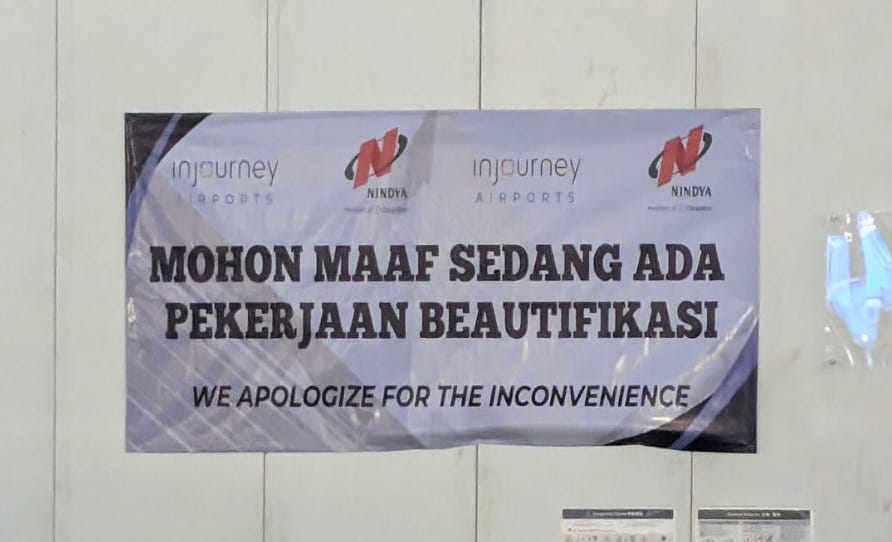PDI-P, Pilkada, eFishery, Gus Miftah, and Prabowo/regional elections
This week (apologies for the delay):
PDI-P kicks out 27 cadres, including Jokowi…
KPU names Pramono winner of Jakarta gubernatorial election
eFishery suspends cofounders amidst embezzlement investigation
Gus Miftah resigns from government amidst controversy
Prabowo considers ending direct elections for local leaders
PDI-P kicks out 27 cadres, including Jokowi
On December 4, PDI-P made headlines for expelling 27 party cadres, including former President Joko Widodo and his family members, Bobby Nasution, and Gibran Rakabuming Raka.
PDI-P framed the expulsions as a result of internal disagreements over policy direction and independent political stances, emphasizing the importance of party unity and discipline. However, the reality is that Megawati is furious with Jokowi for not backing PDI-P’s presidential candidate. Instead, he endorsed his son as a vice-presidential candidate on a ticket with Prabowo and continued to support non-PDI-P candidates in the recent Pilkada elections. It seems that Bu Mega held off from giving the Widodos the boot until after the presidential, legislative, and regional elections, hoping that her party might receive some votes from voters who still saw Jokowi as a member of the party.
In response, political parties Gerindra and Golkar have already signaled their desire for Jokowi to join their ranks. However, the former president has been deliberately vague about his next steps. Although there is speculation that Jokowi may establish his own political party, it’s more plausible that, if he decides to re-enter party politics, he will join an existing party. This is likely due to the party infrastructure and voter base that he can quickly leverage. Starting from scratch would just be too hard. To this end, some analysts think that he may ask Golkar's chairman and ally, Bahlil Lahadalia, to step aside to allow the former president to take over. However, this is all speculation.
KPU names Pramono winner of Jakarta gubernatorial election
On December 8, the KPU, Indonesia’s election commission, officially announced PDI-P cadre Pramono Anung as the next governor of Jakarta. Pramono and his running mate, Rano Karno, secured 2.92 million votes, translating to 50.07% of the total votes cast, winning the race with a narrow winning margin of just 2,925 votes. Pramono’s main rival and former West Java Governor, Ridwan Kamil, garnered 1.71 million votes, falling significantly short of the 50% threshold.
Ultimately, it seems that most Jakartans, especially less educated voters, were primarily drawn to Pramono because of his scandal-free record and his identity as a true native of Jakarta. In contrast, more educated voters appeared to have been motivated by their anger towards former President Joko Widodo for attempting to manipulate election laws to pave the way for his son, Kaesang Pangarep, to participate in the elections. It seems that the nepotism just got to much for some.
Despite the KPU announcing Pramono as the winner, Ridwan’s campaign team stated that they would challenge the results in several electoral districts in Jakarta, aiming to overturn the outcome in the Constitutional Court. To trigger a runoff, they only need to flip a few thousand votes. While there is well-founded skepticism about the Constitutional Court's impartiality given what happened this year and last year (Gibran cough* cough*, Kaesang cough* cough*), it seems unlikely that certain influential figures would expend their valuable political capital to challenge the election, particularly when Anies, who is adversary numero uno, is not directly involved.
Lastly, I’ll just make a point about voter turnout for the Jakarta pilgub. Turnout for this election was notably low, with only 4.72 million out of 8.21 million registered voters participating. This low voter engagement is likely attributed to voter fatigue following the recent presidential election earlier this year.
eFishery suspends cofounders amidst embezzlement investigation
Indonesian aquaculture startup eFishery has suspended its co-founders, CEO Gibran Huzaifah and CPO Chrisna Aditya, amid an investigation into alleged embezzlement of company funds. The suspension was led by the company’s investors, who were concerned by discrepancies in financial performance and revenue reports associated with the two founders, who each own approximately 9% of the company's shares.
In light of the suspensions, eFishery has appointed interim leadership, with Adhy Wibisono stepping in as interim CEO and Albertus Sasmitra taking on the role of interim CFO. The company stated that these decisions were made in consultation with its shareholders to enhance corporate governance and uphold ethical practices. eFishery's investors include prominent institutional players like SoftBank, Temasek, and UAE’s 42XFund.
Although eFishery has acknowledged the ongoing investigation, it has not provided specific details about the alleged financial misconduct, including the amount of funds involved or the exact nature of the misconduct. Earlier this year, eFishery raised substantial capital, securing $200 million in Series D funding, which increased its valuation to over $1 billion. Additionally, the company obtained $30 million in a conventional debt round in May 2024.
The eFishery investigation could negatively impact Indonesia's startup ecosystem, which has largely avoided the corruption and fraud that often affects established industries in the country. If the founders are found guilty of misappropriating funds, it could make international investors hesitant to invest in ambitious projects like eFishery, potentially cooling support for Indonesia’s vibrant startup scene.
Gus Miftah resigns from government amidst controversy
Celebrity Islamic preacher Miftah Maulana Habiburrahman known commonly as Gus Miftah resigned from his role as Special Envoy to the President for Religious Harmony and Development after he publicly insulted an ice tea seller at one of his preaching events on November 20. At the event, Miftah mocked an ice tea seller by calling him "goblok" (stupid). Videos of the insult quickly spread on social media and immediately attracted criticism. This issue gained traction because many viewed it as a wealthy and influential individual mocking someone of lower social standing without any valid reason other than their job. There were some great TikTok videos of netizens mocking Miftah (here).
Miftah’s conduct quickly saw a petition emerge calling for his dismissal as special envoy, which garnered over 318,000 signatures within two days. Soon after, President Prabowo Subianto intervened and instructed Miftah to apologize to the street vendor, which Miftah eventually did. He later visited the seller, Sunhaji, to offer a personal apology and clarification that his remarks were intended as a joke.
However, an apology wasn’t simply going to cut it for old Miftah. Indonesian netizens wouldn’t let the issue go and continued to question why Miftah had been chosen as the religious harmony envoy when there were plenty of more qualified candidates to choose from. Public pressure ultimately reached a tipping point, prompting Miftah to announce his resignation as the Presidential Special Envoy for Religious Harmony and Development during a press conference. It appears that Prabowo likely urged Miftah to step down, as failing to do so risked tarnishing his own pro-people image.
Prabowo considers ending direct elections for local leaders
Prabowo Subianto sparked controversy last week by revisiting one of his long-standing pet issues: eliminating regional elections. During the 60th anniversary celebration of Golkar’s establishment, Prabowo proposed eliminating regional elections and replacing it with a system where governors, mayors, and regents would be appointed by regional legislatures. He framed the changes as a strategy for cost savings, pointing out that the 2024 regional elections racked up a bill for the state worth IDR 37.52 trillion (US$2.29 billion).
Prabowo argued that trillions of rupiah are wasted on election expenditures, suggesting that this money could be better allocated elsewhere. To bolster his point, he referenced the governance systems of India, Singapore, and Malaysia, all of which utilize a representative system.
Several politicians from parties such as Golkar, PKB, and PKS have already voiced their support for his proposal, echoing the sentiment that cost savings would be beneficial for the state. However, their support is more likely due to the changes strengthening the influence of political parties within Indonesia’s political system as well as winning brownie points from Prabowo.
Historically, during the New Order regime under Suharto, governors were appointed based on recommendations from local legislatures. However, in 2004, direct elections were instituted following significant reforms that marked Indonesia's transition from authoritarianism to democracy.
It remains unclear what form these potential reforms would take. Would they resemble Singapore's representative model, or revert to the New Order's approach? Ganjar Pranowo, a former presidential candidate and PDI-P member, has called for a thorough review of the proposal amid concerns that Prabowo might expedite legislative changes through parliament using his supermajority.
Overall, this announcement has raised serious concerns about Prabowo’s commitment to democracy in Indonesia. More to come on this issue, i’m sure.
All opinions are my own.





